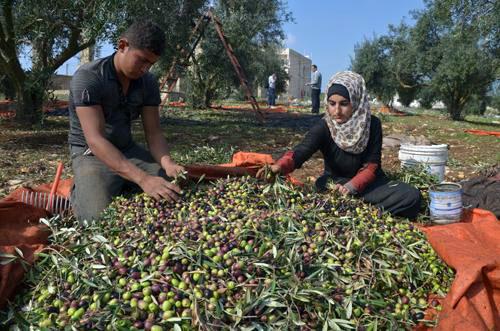You are here
Unionist says Israel sells Jordanian olive oil as Israeli product
By Merza Noghai - Oct 14,2014 - Last updated at Oct 14,2014

AMMAN — An olive sector leader on Tuesday urged stakeholders not to export olive oil to Israel, which he said re-exports it as an Israeli product.
Hussein Ruqeibat, deputy president of the Union of Olive Press Owners and Olive Producers, said Jordanian farmers should benefit from these products, calling for exporting to Arab Gulf countries for more financial revenues.
“The price of an olive oil container this year will range between JD70 and JD 80,” Ruqeibat said, noting that last year’s price ranged between JD60 and JD70.
The olive picking season, which usually begins in October, started this week across the Kingdom’s olive groves.
Jordan is among the top 10 producers of olives and olive oil in the world and enjoys self-sufficiency, exporting the surplus mainly to Europe.
Ruqeibat called on citizens to buy their needs of olive oil directly from farmers or olive oil presses, and ask for a receipt to guarantee a refund if the quality is not good.
The average per capita consumption of olive oil in Jordan stands at about 3.43 kilogrammes per year, and the country’s overall annual consumption stands at about 21,773 tonnes.
Ruqeibat said there are about 142 olive oil presses with 500 production lines spread across the Kingdom, but some owners are considering selling their presses due to the spread of “fake olive oil”.
“Genuine olive oil can be identified by its greenish colour, sharp taste and apple-like flavour,” Ruqeibat told The Jordan Times over the phone.
He noted that the presence of fake olive oil has decreased in the local market due to the Syrian crisis, since most of these products used to enter the Kingdom through the Syrian border. A container of fake oil was sold for around JD30 in 2009.
Olive-planted areas in the Kingdom are estimated at 1.4 million dunums.
According to the National Centre for Agricultural Research and Extension, there are over 17 million olive trees in the country, nearly half of which are in the northern region.
“Bani Kinanah District in Irbid [some 80km north of Amman] has between 1.2 and 1.3 million olive trees, constituting 33 per cent of olive trees in Irbid,” Ruqeibat said.
He voiced appreciation to the French Development Agency and the Agriculture Ministry for their cooperation with the Olive and Olive Oil Farmers Society of Kfarat in Bani Kinanah villages in organising awareness courses for olive farmers on picking, storing and pressing olives.
Related Articles
AMMAN — The Ministry of Agriculture rejected the entry of 1,500 olive oil bottles to the Kingdom for not meeting the Jordanian standards, th
AMMAN — The Ministry of Agriculture has decided not to allow the export of olives this year in order to achieve a balance among farmers, mer
AMMAN — The Agriculture Ministry will continue banning the import of olive oil to support local production and farmers, Agriculture Minister

















